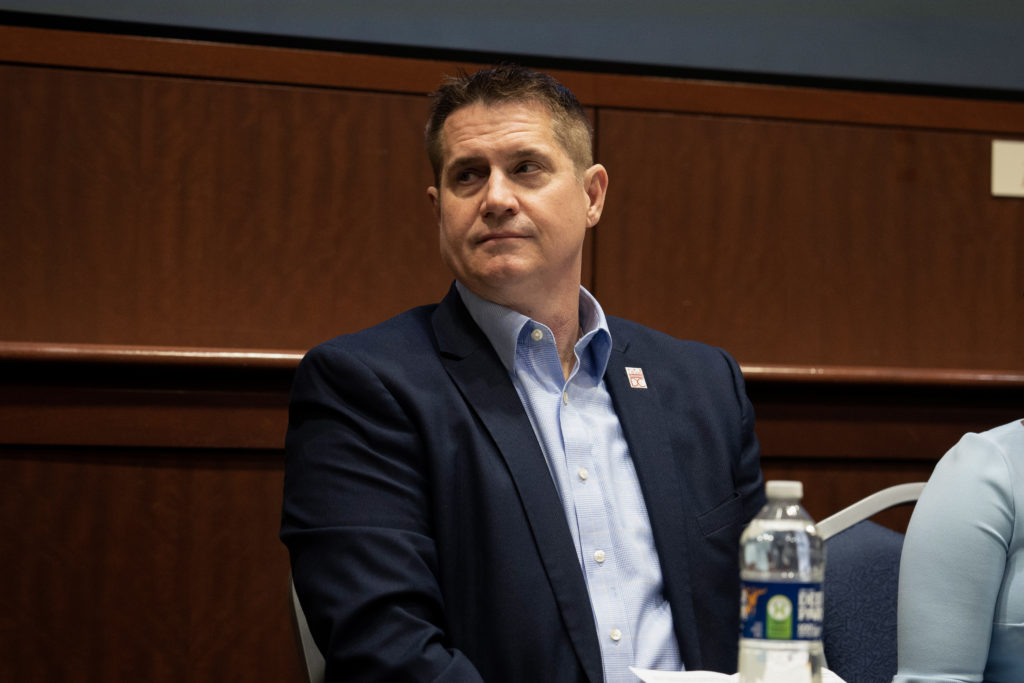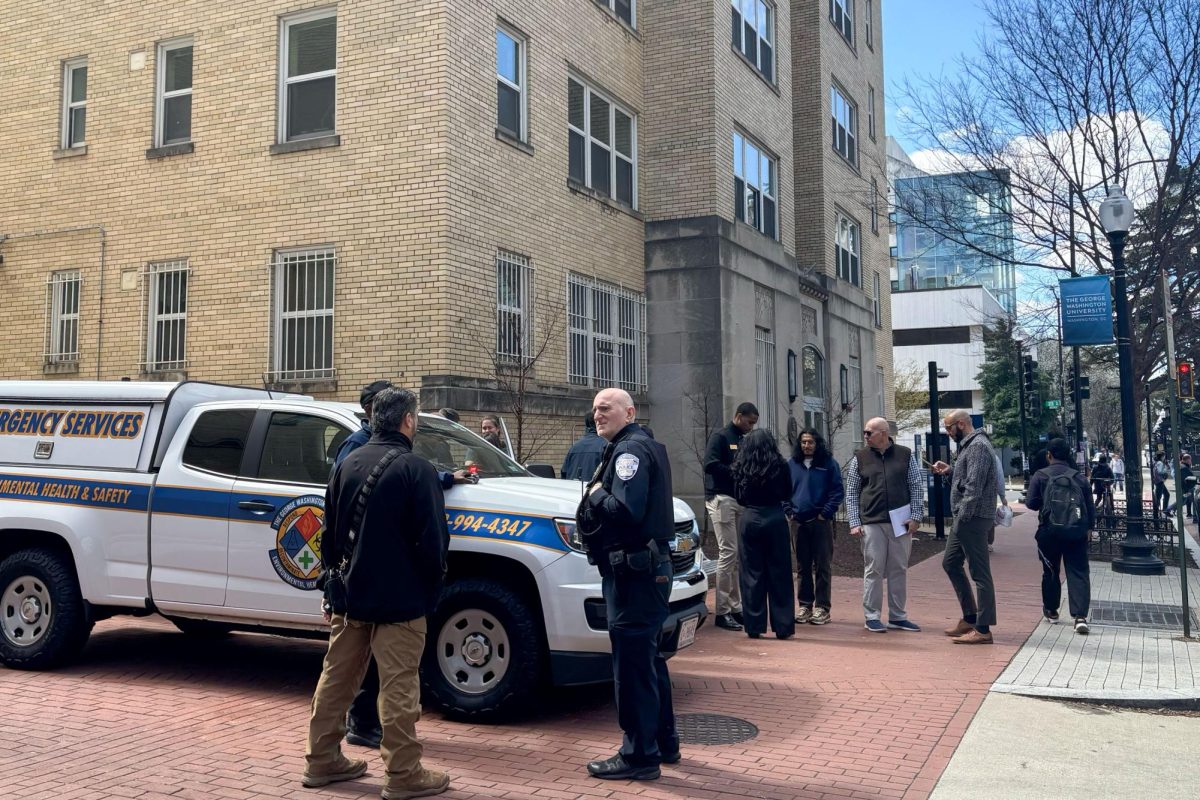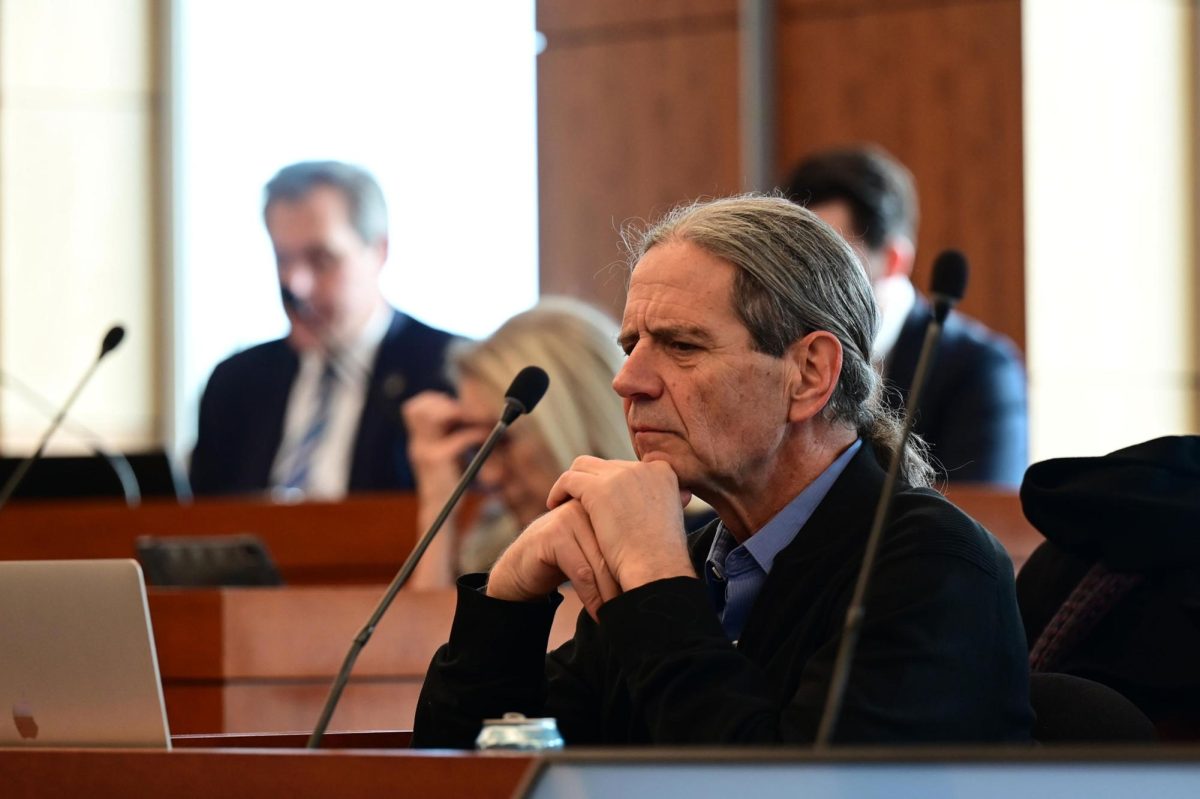Updated: April 6, 2023, at 5:39 p.m.
Content warning: This story contains references to sexual violence. If you have any questions about the reporting, please contact the editor at eic@gwhatchet.com.
The chair of Foggy Bottom’s local governing body is a registered sex offender in Florida, and court records reveal a criminal history he had not publicly disclosed in D.C. before this week.
Joel Causey – the highest-ranking official on the Foggy Bottom and West End Advisory Neighborhood Commission, which represents residents on and near campus – was convicted in 1998 for a sexual offense involving a boy under 16 years old in Jacksonville, Florida between 1995 and 1996, according to Duval County, Florida court documents. ANC commissioners said the public should have a right to know if their elected representatives have a criminal history, even in another state.
D.C. has no law requiring public officials divulge their criminal background. Causey is not listed on the District’s sex offender registry.
A collection of documents from Florida courts show Broward and Duval counties filed at least 27 charges against Causey from 1994 through 1997, the year he was charged for the sexual battery case.
“People make mistakes in life, and people should have a pathway forward to redemption in life,” Causey said in an interview with The Hatchet. “The people that serve their time should be able to go forward in life and not be constantly having to be reconvicted over and over again about things they did in the past.”
Causey said he is not required to register himself on the D.C. sex offender list because the District “forgives” convictions from more than 10 years ago. He said he only remains on the Florida registry because of the state’s “very strange” laws mandating lifetime registration for all sex offenders and predators.
Mandates for sex offender registration in D.C. expire 10 years after the sex offender is released from supervision, with the exception of those who committed a “lifetime” registration crime, like first- and second-degree sexual abuse and child sex abuse. In Florida, sex offenders who “prey on” children are considered sexual predators and must maintain registration for the duration of their life unless the criminal division of a circuit court grants their petition to remove their designation, according to 1997 Florida sex offender registry requirements.
Causey said he has never attempted to remove his sex offender registration in Florida because he doesn’t live there.
“I really don’t care,” he said. “I think anybody who looks at your record of 25 years ago is a horrible person in that sense anyways.”
Causey has served on the ANC since January 2021 and currently represents single-member district 2A06, which reaches within a block of campus and spans The Savoy, Call Your Mother Deli and the Ritz-Carlton.
Criminal charges filed against John Causey, 1986-1997
Causey listed as lifetime Florida sex offender after 1998 sexual battery conviction
Causey pleaded guilty in 1998 to a “lewd or lascivious act - sexual battery” offense, in which he engaged in oral “and/or” anal sex with a boy under 16. Court records show former Duval County Judge Henry Davis sentenced Causey to 30 months for the crime in 1998.
Causey was either 27 or 28 years old at the time of the sexual offense, based on his date of birth listed on court documents and his D.C. voter registration. The offense took place between Oct. 17, 1995 and Oct. 17, 1996. He is now 54 years old.
Causey has no criminal charges in the District, according to court records. He said he has been a “model citizen” for the 23 years following his release from prison for the sexual battery charge. After he served 22 months, with 134 days of jail-time credit, the Florida Department of Corrections released Causey from prison Jan. 28, 2000 and canceled his 18-month probation the same day, according to his inmate record and court documents.
Causey’s sex offender registration file states the Florida Department of Law Enforcement reported his last permanent address in Arlington, Virginia in 2009.
The Florida sex offender registry lists Causey’s name as John E. Causey, and he confirmed the registration to be his, adding that “John Causey” is his legal name.
Causey said he was in a nine-month relationship with a 17-year-old girl, whom he met at a nightclub, while he lived in Florida. He said he had no knowledge of her age throughout the relationship and broke up with her after she revealed she was underage. Court records show Causey was not convicted for his involvement in the relationship, and it's unclear if prosecutors pressed charges for it.
Causey said he admitted to their relationship when police investigated it, and she “sued the sh*t” out of him following their breakup.
“I'm not denying what I did in the past,” Causey said. “I was a young kid. I was a young kid in a nightclub business with my family, doing drugs and living the life in Florida, having a good old time. And I didn't always make the greatest decisions in life.”
Causey said anyone who made “mistakes” when they were young is entitled to a future “undamaged” by their past. A 2014 D.C. law restricts “most” employers in the city from asking job applicants about criminal accusations or arrests. Employers can only ask about criminal convictions after they make a conditional offer of employment.
Authorities remain quiet while local officials call for transparency
Commissioner Yannik Omictin called for Causey to step down from his chair position on the ANC. He said Causey’s failure to disclose his criminal history seems like a “deliberate obfuscation” of parts of his past that should’ve come to light. Commissioner Jim Malec said he "agreed" with Omictin in calling for Causey to step down from his chair position in a Thursday afternoon tweet reacting to the article.
"Chair Causey should step down from his ANC 2A leadership position,” Malec said in the tweet.
Malec and Commissioner Trupti Patel said the general public deserves to know if an elected official has a criminal history.
“Serving in elected office is a privilege that is based on public trust, and voters have a right to know if a candidate has a criminal background before casting their ballots,” Malec said in a statement to The Hatchet. “Additionally, commissioners should have the opportunity to take such information into consideration when deciding whether or not to elevate someone to a position of authority, such as a chairmanship.”
U.S. Marshals Service spokesperson Barry Lane declined to comment on information “related to a specific individual,” deferring to a Department of Justice FAQ on the Sex Offender Registration and Notification Act. Sex offenders are required to “update their registration in each jurisdiction they reside, are employed or attend school,” according to the FAQ website.
A Jacksonville Sheriff’s Office spokesperson declined to comment.
Metropolitan Police Department spokesperson Alaina Gertz deferred questions about Causey and D.C. sex offender registry laws to D.C.’s Sex Offender Registration FAQ and the D.C. Code for Sex Offender Registration “in the interest of time."
Renée Williams, the executive director of the National Center of Victims of Crime – a crime victims advocacy nonprofit – said sex offender registration requirements and the officials who oversee the cases can vary between states.
“It's really whatever D.C. has decided is important to them, on what he was convicted on in Florida, as to what he needs to actually register to,” Williams said.
Following an interview with Causey, he sent an email at 9:36 p.m. Tuesday to ANC commissioners and local officials, including Ward 2 D.C. Council member Brooke Pinto, GW Community Relations Director Kevin Days and the D.C. Office of ANCs. In the email obtained by The Hatchet, Causey admits to “engaging in sexual relation with a 17-year-old” and charges regarding drugs, insurance fraud and bounced checks.
Causey said he does not intend to resign, according to the email. While he did not deny the charges in an interview Wednesday morning, he said charges from 30 years ago do not reflect a person’s current “status” in the community.
“I do take full responsibility for my past criminal behavior and offer no excuses,” Causey’s email states. “I know that my actions were wrong, and I am not proud of them. However, after spending two years in jail paying for my crimes I made a conscious decision to change my ways.”
At-Large D.C. Council member Robert White Jr. – who chairs the D.C. Council Committee on Housing, which is responsible for ANCs – did not immediately return a request for comment.
Pinto said formerly incarcerated individuals, also known as returning citizens, “deserve the chance” to rejoin public life, which is “necessary” to prevent repeat offenses.
“It is especially admirable when returning citizens not only turn their lives around for themselves, but choose to dedicate their time to public service and giving back to their community,” Pinto said in a Wednesday statement to The Hatchet.
Causey elected twice to ANC chair, appointed to Bowser board
Commissioners voted for Causey to serve as the chair of the ANC last February in a 5-2-1 vote and again in January in a 5-3 vote. As chair, Causey oversees local matters for the commission and its roughly 18,000 D.C. residents, which include President Joe Biden.
Causey represents one of 346 SMDs in D.C. in one of the city’s 46 ANCs. D.C. government agencies are required to give “great weight” to ANC recommendations, like housing and traffic safety policies and community grants.
Causey contributed to a local effort to grant money to Foggy Bottom fire victims after a November fire broke out in St. Mary’s Court apartment building, an affordable senior living home. Causey said he planned to improve sidewalk safety and help house individuals experiencing homelessness in his second term.
Causey and two other ANC commissioners spoke at GW for a panel the Student Association hosted last month in the University Student Center, where he encouraged students to run for local office and forge community partnerships.
In addition to chairing the local ANC, Causey has about 20 years of D.C. construction experience, including his work as a project executive at D.C. construction company Redbrick, which he began in October 2022, according to his now-offline LinkedIn. He also helped oversee the construction of Nationals Park as a manager for Turner Construction, where he worked from 2003 to 2011, according to the page.
Mayor Muriel Bowser appointed Causey as a member of D.C.’s Construction Codes Coordinating Board in August 2017, a body that reviews and updates building codes every month, where he continues to serve. A spokesperson for the D.C. Office of the Mayor did not immediately return multiple requests for comment.
Causey’s Florida court records divulge deeper criminal background
Court documents show Causey’s 1998 conviction for the “lewd or lascivious act - sexual battery” involved him “placing his mouth upon the penis of” the child “and/or placing his penis upon the anus of” the child, according to court documents.
A Duval County prosecutor charged Causey in June 1997 with three counts of the sexual battery charge, one count of “unlawful sexual activity - intercourse with certain minors” and one count of the “possession of a firearm - concealed weapon by convicted felon,” according to court records. Court records show Causey pleaded not guilty to the charges but later pleaded guilty to the second count of sexual battery in March 1998, resulting in a prosecutor dropping the other four charges.
Jacksonville Sheriff’s Office Detective Jason Pough, who worked in the sex crimes unit at the time, said “at least six” individuals reported sexual violence incidents involving Causey, and there “might be more,” with cases dating back three years, according to a 1997 Florida Times-Union report. Causey has only been convicted of one count of sexual battery.
Causey said the reports from others who came forward after his sexual battery charges were “bullsh*t,” and he alleged they wanted financial compensation from his family, whom he said had a “sh*tload” of money.
Causey pleaded no contest to possession of methamphetamines in 1995, according to a 1998 Broward County case ruling. He was sentenced to two years of probation and 233 days in jail, which he served while awaiting trial, according to the case docket.
In 1995, Duval County found Causey guilty of “false fraud insurance,” a felony charge, according to a sentencing court document. Court records state he was sentenced to one year of probation for attempting to defraud State Farm Fire and Casualty Company for camera equipment. His arrest report for the case lists Joel Causey as an alias for John Edward Causey Jr.
Causey was convicted of or did not contest four charges of using false checks to obtain property worth less than $150 filed from 1995 through 1997, according to Duval County court records.
If you have a tip, please email sne@gwhatchet.com.
Nicholas Anastacio contributed reporting.
This post has been updated to clarify the following:
The Hatchet updated this post to clarify that Causey was not convicted for the relationship he said he had with a 17-year-old girl in an interview. It is unclear if Causey was prosecuted for that relationship. This post has been updated to a tweet Malec posted Thursday calling for Causey to step down as chair.








